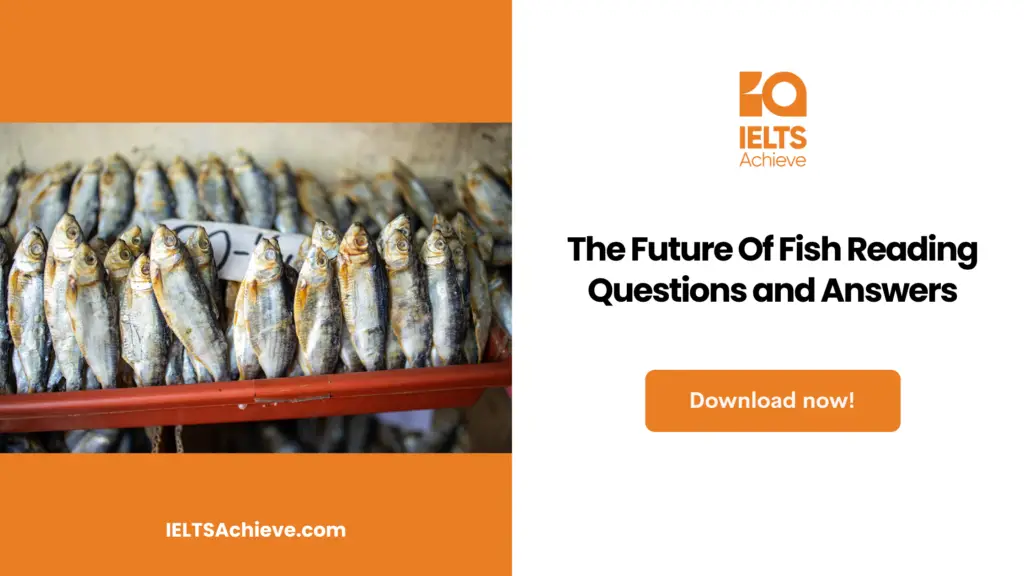The Blog post contains the following IELTS Reading Questions:
- IELTS Reading Yes/No/Not Given
- IELTS Reading Multiple Choice Questions
- IELTS Reading Summary Completion
Stay informed and prepared for success – Explore our comprehensive Reading Test Info page to get valuable insights, exam format details, and expert tips for mastering the IELTS Reading section.
IELTS reading passage – The Future of Fish

The Future of Fish
Since the very first commercial fishermen set their nets and hook a thousand years ago, the ocean’s surface has undergone a radical transformation. The intensity of fishing increased over time, but even in the nineteenth century, there was little need to limit fishing or establish protected areas because it was still believed, quite rightly, that the sea’s abundant resources were largely beyond the reach of fishing. In the history of the oceans, the twentieth century saw an unprecedented increase in fishing intensity, and contemporary fishing techniques make it impossible for fish to hide. The only places to escape fishing today are those we intentionally create. Unfortunately, the area and level of protection offered by the sea lag far behind those of the land.
We have continued to hold onto the idea that the sea is distinct from the land over the centuries as fishing and commerce have grown. We continue to believe that it should be a place where people and nations are free to come and go as they please, as well as a place that is open to our exploitation. We have perhaps been so hesitant to protect the sea because of this. On land, protected areas have multiplied as the population of people has increased. In our battle to preserve the diversity and richness of the wildlife and landscape, we have advanced more here than at the sea. Currently, only three-fifths of one percent of the world’s oceans are protected, compared to twelve percent of the world’s land. Even worse, some fishing is still permitted in the majority of marine protected areas. About one-fifth of the world’s oceans are designated as areas that cannot be exploited in any way.
Today, we are only just realizing how important ‘natural refuges’ from fishing have been for preserving diverse and healthy marine ecosystems as well as fisheries. This does not imply that fish stocks can rebuild the fishing industry on their own; additional management strategies are needed for this. However, the final and most significant component of our package of fisheries management reforms relates to areas that are off-limits to fishing. They support and strengthen all of our other initiatives. Protection has its limits, though.
What has died cannot be brought back by reserves. We will never be able to bring back globally extinct species, and reintroducing extinct animals locally may be necessary if pure dispersal from remaining populations is insufficient. Additionally, we are seeing that fishing can change marine ecosystems into different states where different species mixtures are dominant, as is the case with northern cod in Canada. Since the primary fishing targets have either disappeared or have greatly decreased in number, these species are frequently less desirable. Changes may also be difficult to undo, even with a complete ban on fishing. The fabled Greek king Ulysses is credited with discovering the Mediterranean, which is home to a plethora of monk seals, loggerhead turtles, and porpoises. Food webs have completely changed as a result of their disappearance due to hunting and overfishing, and recovery will likely be much more difficult than their destruction. Therefore, the sooner we take action to protect marine life, the more likely it is that we will be successful.
Making marine reserves is seen by some as an admission of failure. Their reasoning holds that if we have managed our uses of the sea properly, reserves shouldn’t be required. Many managers of fisheries still cling to the hope that one day their models will be successful and that politicians will take their advice. Give the strategy enough time, and they will succeed. How much time still remains? The last 50 years have seen this strategy tested and improved. There haven’t been many victories to add to the managers’ resumes, but there has been an increasing number of setbacks. The Common Fisheries Policy, the instrument used by the European Union to manage fisheries and aquaculture, is a prime example of the worst mistakes that can be made: flawed models, flawed advice, watered-down recommendations from government bureaucrats, and then the disregard of a large portion of this advice by politicians. When everything went wrong, as it had to, Europe sent its boats to other nations to buy fish for a fraction of what it was actually worth.
Ocean wealth is being wasted by humans. Humanity will lose a crucial source of protein as well as other things if we don’t escape this cycle of failure. Human life itself may be affected if natural ecosystem processes like water purification, nitrogen fixation, and carbon storage are disturbed. With some basic common sense management, we can greatly reduce the likelihood that this catastrophic error will occur. The core of the reform is the marine reserves. But if they are only occasionally put into practice, they won’t be enough to support the shaky structure of the “rational fisheries management” that scientists had envisioned in the 1940s and 1950s. They must take center stage as the primary tenet of everything we do in the oceans. When all else fails, reserves are a last resort, not a first resort.
Unlock your full potential in the IELTS Reading section – Visit our IELTS Reading Practice Question Answer page now!
Recommended Questions:
Renewable Energy IELTS Reading Question with Answer
The Future of fish reading questions
Questions 1-5
Do the following statements reflect the claims of the writer of Reading Passage? Write:
YES if the statement agrees with the writer
NO, if the statement contradicts the writer
NOT GIVEN if there is no information about this in the passage
- The re-introduction of certain mammals to the Mediterranean is a straightforward task.
- It is important to encourage people to eat less fish.
- Most protected areas now completely forbid sea fishing.
- Open access to the oceans is still viewed as desirable in general.
- Fishing for business and trade has been practiced for more than a thousand years.
Want to excel in identifying the writer’s views and claims? Click here to explore our in-depth guide on how to accurately determine Yes, No, or Not Given in the IELTS Reading section.
Questions 6-8
Choose the correct option from A-D
6. What criticism does the author have of the Common Fisheries Policy?
- Some of its recommendations were overstated by officials.
- The recommendations it made were hastily put into action.
- It was based on unreliable predictions.
- The recommendations were unreliable.
7. In the fifth paragraph, the writer asks, “How much time still remains?” What does he or she mean by that?
- Governments will be able to plan effectively with accurate predictions.
- Currently, fisheries policies are based on uncertain projections.
- The need for action to safeguard fish stocks is urgent.
- Fisheries managers need to offer more precise information.
8. What is the author’s assessment of the depletion of marine resources?
- The steps already taken to avert a crisis are likely adequate.
- Prioritization should be given to strategies for preventing the worst outcomes.
- Which actions would be the most successful are no longer clear.
- There is currently no likely solution due to the severity of the situation.
Ready to improve your performance in Multiple Choice Questions (MCQs)? Click here to access our comprehensive guide on how to tackle MCQs effectively in the IELTS Reading section.
Questions 9-14
Complete the summary using the list of words/phrases, A-J, below.
Measures to protect the oceans
Up till the twentieth century, the world’s supply of fish was sufficient for its needs.
It was unnecessary to introduce 9________ of any kind because large areas of the oceans were inaccessible.
However, as 10 _________ improved, this situation changed, and in the middle of the twentieth century, policies were introduced to regulate 11 _________
These policies have not succeeded. Today, by comparison with 12 _________ the oceans have very little legal protection.
Despite the doubts that many officials have about the concept of 13 _________, these should be at the heart of any action taken.
The consequences of further 14 _________ are very serious, and may even affect our continuing existence.
Words or Phrases:
A. controls
B. action
C. fish catches
D. failure
E. fishing techniques
F. fish processing
G. large boats
H. marine reserves
I. the past
J. the land
Boost your performance in Summary, Notes, Table, and Flowchart Completion tasks. Click here to explore our detailed guide and learn how to effectively complete summaries, notes, tables, and flowcharts in the IELTS Reading section.
Unlock your full potential in the IELTS Reading section – Visit our IELTS Reading Practice Question Answer page now!
Recommended Questions:
Renewable Energy IELTS Reading Question with Answer
The Future of fish reading answers
1. NO (h6)
2. NOT GIVEN
3. NO
4. YES
5. YES
6. C
7. C
8. B
9. A
10. E
11. C
12. J
13. H
14. D

We hope you found this post useful in helping you to study for the IELTS Test. If you have any questions please let us know in the comments below or on the Facebook page.
The best way to keep up to date with posts like this is to like us on Facebook, then follow us on Instagram and Pinterest. If you need help preparing for the IELTS Test, join the IELTS Achieve Academy and see how we can assist you to achieve your desired band score. We offer an essay correction service, mock exams and online courses.


